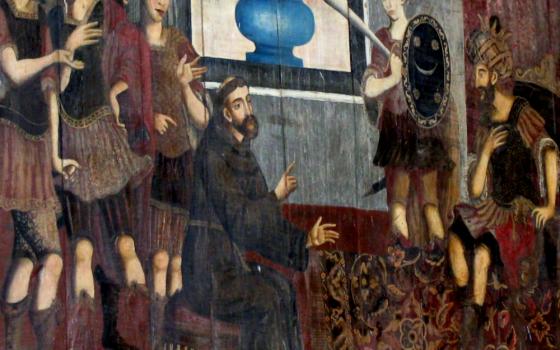More than 200 Third Order Religious Sisters and Brothers met in Buffalo, New York, June 11-14 for the Franciscan Federation Conference. I was one of them. What captured my attention was the title: "Franciscans and Muslims: Lessons from the Past & Prospects for the Future."
I was also attracted by the reputation of the presenters. Sr. Kathy Warren of the Sisters of St. Francis and Franciscan Fr. Michael Calabria have worked for many years on interfaith issues, particularly those around Christian and Muslim faiths.
Their presentation made me ask myself what my challenge is as a Franciscan, at this time when the Supreme Court is deciding on the Muslim ban and the attorney general is using Scripture to justify ripping children out of the arms of their immigrant parents.
Next year will be the 800th anniversary of the meeting of St. Francis of Assisi and Sultan Malik al-Kamil during the time of the Crusades. There is a myth that Francis wanted to martyr himself for the faith, but Warren explained that the core elements of Francis' motivation for the visit were a call to do penance and preach the Christian faith.
He also had a vision of universal kinship and felt the call to be servant and subject to all, not to engage in argument or dispute. What Francis and the sultan really did was share their faith with each other.
Francis was impressed by the prayer lives of the Muslims. They prayed five times a day — a practice he adopted for himself. Francis' praises of God is based on the Islamic 99 names of God. Al-Kamil recognized Francis as a man of prayer and faith. Both dialogued with each other and learned to respect one another.
I always wondered how they were able to speak with each other. I assumed they used translators as they do at the U.N. Now it is believed that Francis must have had some knowledge of Arabic, because of the trading that went on between Arabs and Italians. Francis' father bought textiles and there is some archeological evidence that he bought from Arab traders. (The speaker showed a picture of an Arabic-style textile.) It is probable that both Italians and Arabs knew each other's language.
Not many of us Franciscans knew about the meeting between St. Francis and the sultan until recently. It has been called the "great cover-up," since it was not in the best interests of the church or the empire to recognize or speak of this peace mission.
According to Calabria, the sultan offered to surrender Jerusalem, Ascalon and Tiberius if the Crusaders would give up Damietta. The offer was refused because the pope wanted the complete destruction of Islam.
The Muslims won the battle but refused to kill all the prisoners; instead, they followed their faith by providing food and shelter. Muslims always desired diplomacy before battle.
Calabria reminded us that not all Muslims are good, just as not all Christians are good. Sometimes Christian Scripture or the Quran can be twisted to suit one's own purposes. Think about Jeff Sessions and Romans 13:1, or those who think that people who do not practice Islam are the "infidels" that are mentioned in the Quran.
In actuality, Muslims have great respect for Christians and Jews as "people of the book" since all believe in one God. Those who do not believe in one God, such as the polytheists, are considered the "infidels."
We heard from Mustafa Gokcek, professor of interdisciplinary studies at Niagara University and Amina Golden-Arabaty, a student at St. Bonaventure University and director of a student group for Muslims and their allies. Both have worked on interfaith initiatives for years. Neither has experienced much negativity in the U.S.
Though she usually does not wear the hijab, Golden-Arabaty leads an initiative where she invites other women to wear a hijab for a day. That is when she and they receive "the look."
In 2007, 138 Muslim leaders from every major Islamic sect promulgated "A Common Word" — a call to conversion, an extended "global handshake" if you will. Love of one God and love of neighbor are common to Christianity and Islam. On these faith interactions depend the future of the world.
A historic Catholic-Muslim forum was held the next year, and the U.N. has designated the first week of February as World Interfaith Harmony Week.
I enjoyed watching the film "The Sultan and the Saint," developed by the Unity Productions Foundation. Films produced by Unity are part of long-term educational campaigns aimed at increasing understanding among people of different faiths and cultures, especially among Muslims and other faiths. The DVD is available from Franciscan Action Network.
I realize that as a Franciscan sister, I cannot sit back and ignore faith-based discrimination against Muslims. I am called to increase attempts to dialogue and not be swept up in the hysteria and fear that can be perpetuated in my country.
[Sr. Dorothy Pagosa is the social justice coordinator for the Sisters of St. Joseph of the Third Order of St. Francis. She has been in social justice/systemic change work for 33 years, most of that time also working at the 8th Day Center for Justice in Chicago.]

